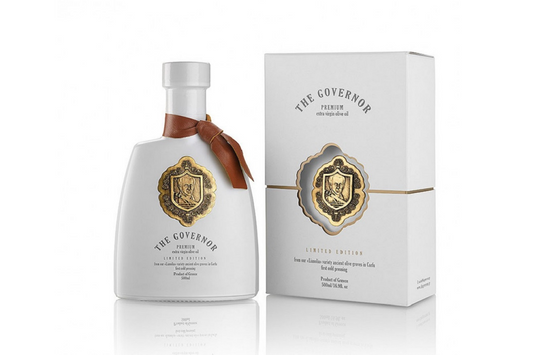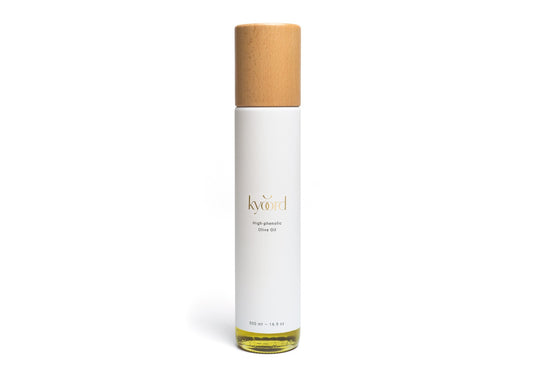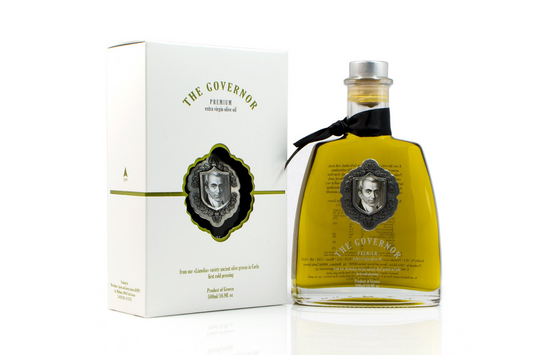What is High Phenolic Olive Oil?
High phenolic olive oil, also known as high polyphenol olive oil, is renowned for its exceptional health benefits. Rich in polyphenols, this medicinal olive oil offers antioxidant and anti-inflammatory benefits, and has been found to reduce inflammation, improve heart health, reduce the risk of cancer, and enhance cognitive function. Understanding the factors that contribute to olive oil with high phenolic content can help you choose the best product for your needs.
Factors like production methods and olive varieties play a crucial role in creating olive oil with high phenolic content. Find out what to look out for when selecting the best high phenolic olive oil for health!
The Best Olive Varieties for High Phenolic Content
Lianolia
Originating from the Greek island of Corfu, Lianolia olives are an olive variety renowned for their robust pepper-y flavor and for their exceptionally high phenolic content. The ratio of oleocanthal and oleacein – two natural compounds recognized for their antioxidant and anti-inflammatory effects – in Lianolia olives is considered ideal for medicinal purposes. Additionally, the Lianolia olive variety does not need to be filtered to increase the shelf life of the oil, resulting in olive oil with higher polyphenol content.
The Governor olive oils are produced from Lianolia olives, and have been tested in numerous scientific health studies due to their medicinal properties.

Koroneiki
Koroneiki olives, predominantly from Greece, are known for their resistance to harsh conditions, which is closely linked to their high polyphenol content. While Koroneiki olives are genetically predisposed to produce high levels of polyphenols, their resilience in tough growing conditions, such as drought, strong winds, and pests, has prompted the olives to increase their polyphenol content as a protective measure over time. Polyphenols serve as antioxidants, helping the plant to combat oxidative stress caused by harsh growing conditions.
These small olives produce high polyphenol olive oil with a robust yet fruity flavor, and numerous health benefits, such as improved cardiovascular health, and anti-inflammatory and antioxidant protection. Our kyoord high-phenolic olive oil is made with a blend of Koroneiki and Lianolia olives.

Kalamon
Kalamon olives, hailing from southern Peloponnese, Greece, are known for their exceptional health benefits. This variety has the highest known concentration of oleocanthal, a molecule that has been extensively studied for its anti-inflammatory properties and its potential to prevent and treat a variety of diseases, including cancer, dementia, arthritis, lupus, and metabolic syndrome, and even improve skin function.
However, this variety is known to oxidize more quickly in storage than other olive oils, and must be refrigerated to ensure maximum oleocanthal content over time.
Our Extremely High-Phenolic Olive Oil is crafted from Kalamon olives, offering unparalleled health advantages for those looking for medicinal olive oil to prevent and treat a health condition.

Other Olive Varieties Known for Higher Polyphenol Content
Several other olive varieties are noted for their high polyphenol content, including Coratina from Italy, Conicabra from Spain, Moraiolo from Italy, and Picual from Spain. Each of these varieties contributes to the diversity and richness of high phenolic olive oils available globally.
Production Methods for High Polyphenol Olive Oil
In addition to olive variety, the polyphenols in olive oil are also affected by the production method. Key factors like cold pressing, harvest time, and the climate can have a significant influence on the production of olive oil with high phenolic content.
What is Cold-Pressed olive oil?
Cold-pressed olive oil is extracted without the use of heat or chemicals, which helps preserve the polyphenols in olive oil. This method ensures that the beneficial compounds are not degraded during the extraction process, resulting in olive oil with a higher concentration of powerful phenolics like oleocanthal.
Harvest time: The Significance of Early Harvest
Early harvest refers to picking olives when they are still green and unripe. This stage is when the polyphenol levels in olives are at their peak, resulting in olive oil with high phenolic content. Although early harvest yields less oil, the quality and phenolic content are significantly higher.
The Role of Climate
Climate also plays a pivotal role in the phenolic content of olive oil. Optimal growing conditions, such as the right balance of sunlight, temperature, and rainfall, are crucial for the development of polyphenols in olives. Mediterranean climates, with their warm, sunny days and cool nights, are particularly conducive to producing high phenolic olive oil, ensuring the highest quality medicinal olive oil.
Why Choose High Phenolic Olive Oil?
Choosing high phenolic olive oil means opting for scientifically-backed health benefits. Studies have shown that polyphenols, especially oleocanthal and oleacein, in olive oil can reduce the risk of chronic diseases, improve heart health, reduce the risk of dementia-related mortality, and provide powerful anti-inflammatory and antioxidant effects. This makes high phenolic olive oil not just a culinary delight but a vital part of a health-conscious diet.
Scientists are consistently studying the medicinal properties of olive oil, helping us understand the vast health benefits of high phenolic olive oil and its importance in our day-to-day diet. Need ideas? Get 12 ways to include olive oil in your daily diet.
From the choice of olive variety to meticulous production methods, every step is crucial in creating medicinal olive oil with high phenolic content. When shopping for high phenolic olive oil, it’s important to select brands that are committed to producing high polyphenol olive oil to ensure the products deliver maximum health benefits.
FAQ
What is high phenolic olive oil?
High phenolic extra virgin olive oil, or medicinal olive oil, is a type of olive oil that contains a high concentration of polyphenols, natural compounds with powerful antioxidant properties. To qualify as high phenolic, olive oil typically needs to have a minimum of 250-300 mg/kg of polyphenols. These polyphenols offer various health benefits, such as reducing inflammation, protecting against heart disease, reducing the risk of cancer, and supporting overall well-being.
Which olive oil has the most polyphenols?
High-phenolic olive oil generally contains the most polyphenols. Specific varieties like Koroneiki, Lianolia, and Kalamon are particularly known for their high polyphenol content. The production methods and growing conditions also play a significant role in maximizing the polyphenol levels in the final product.
How do you know if olive oil is high in polyphenols?
To determine if olive oil is high in polyphenols, look for third-party certification on the label, which indicates tested polyphenol levels. Additionally, high phenolic olive oil often has a distinctively robust and slightly bitter taste, indicative of the high polyphenol levels. A taste test can reveal a peppery sensation in the throat, a hallmark of high polyphenol content. Learn more about how to spot olive oil fraud here.
Does cooking destroy polyphenols in olive oil?
While cooking can reduce the polyphenol content in olive oil, it does not completely destroy it. Some polyphenols are heat-sensitive, and their levels may decrease when exposed to high temperatures for extended periods. However, studies have shown that high-heat cooking with extra virgin olive oil is safe and can even improve the nutritional profile of foods, and is a healthier and safer option than other cooking oils, like canola and sunflower oils.
How much polyphenols are in olive oil?
The amount of polyphenols in olive oil depends on the type of olive oil, the production method, and the olive variety. Authentic extra virgin olive oil typically has more polyphenols than virgin olive oil. However, high phenolic olive oil, or high polyphenol olive oil, will have the highest concentration of polyphenols due to the unique commitment to maximize health benefits.
What is the healthiest olive oil?
High phenolic extra virgin olive oil (also known as high polyphenol olive oil or medicinal olive oil) is known for its high concentration of health-promoting polyphenols, especially oleocanthal and oleacein – two powerful anti-inflammatory and antioxidant molecules associated with numerous health benefits.










